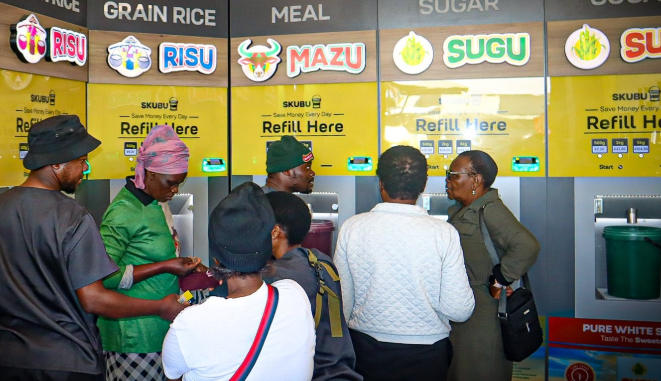
A pioneering retail concept has opened its doors at Chuma Mall in Diepsloot, SKUBU, South Africa’s first fully automated refill store. Spearheaded by Sonke Retail, this project offers a smart, packaging-free shopping experience designed to benefit both the planet and the local community. Piloting sustainable and affordable access to essentials in underserved areas.
SKUBU operates via Internet-of-Things (IoT) enabled machines that dispense everyday items like cooking oil, maize meal, sugar, water, and cleaning products directly into customers’ own containers. By charging per litre and eliminating disposable packaging, the store tackles both environmental waste and affordability, with savings of up to 50% compared to traditional retail formats.
The initiative runs under the Circular Economy Demonstration Fund and brings together multiple partners like Sonke Retail, the Council for Scientific and Industrial Research (CSIR), the Department of Science, Technology and Innovation (DSTI), and TRANSFORM (backed by Unilever, the UK’s FCDO, and EY).
Professor Linda Godfrey, head of CSIR’s Circular Innovation SA programme, highlights the collaborative nature of the project as a great demonstration initiative to show how circular economy principles can be implemented through collaboration.
Meanwhile, Dr Mmboneni Muofhe, DSTI’s Deputy Director General for Socio‑Economic Innovation Partnerships, emphasised how the project amplifies both environmental protection and enterprise development.
One of the participating brands is Manzi Water, which is offering clean, safe drinking water for just R1.00 per litre, a fraction of what comparable bottled water would cost. Alfred Challis, CEO of Manzi Water, commented: “Our inclusion in the SKUBU Project underscores our commitment to making safe, clean drinking water accessible to all, and we are excited to see the positive impact this will have in Diepsloot.”
Sonke’s refill machines are more than simple dispensers, they feature backend software that tracks stock movement from storage to sale in real time, streamlining restocking and maintaining inventory transparency. Additionally, SKUBU ambassadors are stationed in-store to guide first-time users and ensure a smooth shopping experience.
In a township often described as “underserved,” the SKUBU store blends affordability, environmental responsibility, and convenience. It empowers residents to pay only for what they need, minimizing food waste while keeping costs manageable, and without reliance on single-use plastics.
As the first pilot of its kind globally, SKUBU hopes to serve as a scalable blueprint for circular-economy retail, particularly in lower‑income communities. The core partners anticipate that success here could lead to roll‑out across additional Licensee networks in South Africa.

Leave a Reply